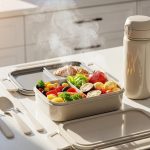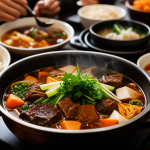The wholesale coffee market reached $19.2 billion globally, reflecting the growing demand for quality coffee solutions across businesses. Partnering with the right bulk supplier can reduce your coffee costs by up to 40% while ensuring consistent quality for your customers. How do you navigate this expanding market to find a supplier that truly understands your business needs?
Understanding the UK Coffee Market Landscape
The UK coffee market has experienced remarkable transformation over the past decade, with wholesale coffee sales reaching £4.2 billion according to the British Coffee Association. This growth reflects a fundamental shift in British drinking habits, where quality coffee has evolved from luxury to daily necessity across cafes, restaurants, and workplace environments.
In the same genre : Uncover the rich flavors of italian coffee beans today
Independent coffee shops are driving much of this expansion, with new establishments opening at unprecedented rates in cities beyond London. These businesses represent significant opportunities for wholesale suppliers who can offer consistent quality, competitive pricing, and reliable delivery schedules that keep operations running smoothly.
Regional sourcing has become increasingly important for cost-conscious operators. Partnering with local suppliers reduces transportation expenses, ensures fresher products, and supports faster response times when businesses need emergency restocks or seasonal adjustments to their coffee offerings.
Also to discover : Could Local Ingredients Revolutionize UK Cuisine?
The most successful cafes and restaurants are those that view their coffee supplier as a strategic partner rather than just a vendor. This approach opens doors to comprehensive support including barista training, equipment maintenance, and market insights that can significantly impact profit margins and customer satisfaction levels. Companies like John Street Beverage demonstrate that the best partnerships go beyond simple transactions, offering comprehensive support from bean selection to barista training.
Key Criteria for Selecting Quality Wholesale Coffee Providers
Choosing the right wholesale coffee supplier can make or break your cafe’s reputation. The decision impacts everything from customer satisfaction to your bottom line, making it crucial to evaluate providers against proven criteria.
Smart business owners look beyond basic pricing to assess the complete package. Here are the essential factors that separate exceptional wholesale coffee providers from average ones:
- Bean quality and origin – Look for suppliers offering single-origin options, detailed cupping scores, and transparent sourcing information
- Certifications and standards – Verify Fair Trade, Organic, Rainforest Alliance, or other relevant certifications that align with your values
- Competitive pricing structure – Compare not just unit prices but volume discounts, payment terms, and total cost of ownership
- Reliable delivery schedules – Consistent supply chains with flexible delivery windows to match your business rhythm
- Additional services – Equipment leasing, maintenance support, barista training programs, and marketing assistance
- Complete traceability – Full visibility into the coffee’s journey from farm to your establishment
- Sustainability practices – Environmental responsibility and ethical sourcing that resonates with conscious consumers
- Technical support – Expert guidance on brewing techniques, equipment optimization, and menu development
- Order flexibility – Accommodation of varying order sizes and seasonal demand fluctuations
Cost Benefits and Volume Requirements
The financial advantages of wholesale coffee purchasing become immediately apparent when you examine the price differential. Most establishments see cost reductions of 30-50% compared to retail pricing, with savings scaling proportionally to order volume. These margins allow cafes and restaurants to maintain competitive pricing while protecting their profit margins in an increasingly challenging market.
Minimum order quantities typically range from 20-50kg for specialty blends, though many suppliers offer flexible arrangements for smaller establishments. The key lies in balancing storage capacity with cash flow requirements. Smart inventory management means calculating your weekly consumption and ordering 4-6 weeks of supply to maximize bulk discounts while maintaining bean freshness.
Return on investment calculations vary significantly by establishment type. A busy cafe serving 200 cups daily might recoup their initial wholesale investment within three weeks, while a restaurant with moderate coffee service could see payback within two months. The mathematics become even more compelling when factoring in reduced ordering frequency and administrative overhead.
Storage considerations require careful planning, but the investment in proper containers and climate control typically pays for itself within the first quarter through preserved coffee quality and reduced waste.
Beyond Bean Supply : Comprehensive Business Solutions
Premium wholesale coffee suppliers understand that successful cafes and restaurants need more than just quality beans. Today’s leading distributors offer complete business partnerships that extend far beyond simple product delivery, providing comprehensive solutions designed to elevate your entire coffee service operation.
Professional barista training forms a cornerstone of these extended services. Experienced suppliers provide hands-on workshops covering brewing techniques, milk steaming, latte art, and customer service skills. This investment in your team’s expertise directly translates to improved customer satisfaction and higher profit margins through consistent quality delivery.
Equipment consultation and procurement represent another valuable service dimension. Suppliers leverage their industry connections to source commercial-grade espresso machines, grinders, and brewing equipment at competitive rates. Many offer maintenance support and technical troubleshooting, ensuring your operations run smoothly without costly downtime.
Menu development consultation helps establishments create compelling coffee offerings that align with their brand identity and target market. Suppliers work closely with business owners to develop signature drinks, seasonal specials, and food pairings that maximise revenue potential while maintaining quality standards.
Marketing support often includes branded materials, staff uniforms, point-of-sale displays, and digital marketing resources. These turnkey solutions enable businesses to establish professional coffee service operations with minimal setup complexity and maximum market impact.
Sustainability and Ethical Sourcing Considerations
Today’s British consumers increasingly demand transparency and sustainability from their coffee suppliers. Ethical sourcing certifications like Fairtrade, Rainforest Alliance, and UTZ have become critical differentiators in the competitive UK coffee market. These credentials demonstrate your commitment to supporting farming communities and environmental protection.
The environmental impact of coffee production extends far beyond the cup. Carbon footprint reduction, sustainable packaging, and water conservation practices throughout the supply chain directly influence consumer purchasing decisions. Establishments showcasing their environmental responsibility often experience enhanced customer loyalty and positive brand perception.
Traceability represents another cornerstone of ethical sourcing. Knowing precisely where your beans originate, how farmers are compensated, and what growing practices are employed builds consumer trust. Many UK coffee shops now prominently display their bean origins and farmer partnerships, transforming sustainability into a powerful marketing asset that resonates with environmentally conscious customers.
Building Long-term Partnerships with Coffee Distributors
Successful coffee businesses understand that choosing a supplier is just the beginning. The real value lies in cultivating a partnership that evolves with your business needs and market demands.
Clear communication forms the backbone of any lasting business relationship. Regular check-ins with your distributor help identify emerging opportunities and address challenges before they impact your operations. Share your business goals, seasonal fluctuations, and upcoming expansions to enable your supplier to plan accordingly.
As your business grows, your coffee requirements will naturally change. A reliable partner adapts their service levels, introduces new products that match your evolving customer preferences, and provides scalable solutions. This flexibility proves invaluable when launching new locations or adjusting menu offerings.
The most successful partnerships extend beyond simple transactions. Look for distributors who offer ongoing support through staff training updates, market insights, and technical assistance. This collaborative approach ensures your business stays competitive while building mutual trust and understanding that benefits both parties long-term.
Your Questions About Wholesale Coffee Supply
Finding the right wholesale coffee partner can transform your business operations and customer satisfaction. These frequently asked questions address the most common concerns from cafe owners, restaurants, and hospitality businesses looking to optimize their coffee supply chain.
How do I find a reliable wholesale coffee supplier for my cafe?
Look for suppliers with proven track records, quality certifications, and comprehensive support services. Check references from existing clients and evaluate their sustainability practices, delivery reliability, and customer service responsiveness.
What should I look for when choosing a bulk coffee bean supplier?
Prioritize freshness guarantees, ethical sourcing certifications, consistent quality control, flexible ordering options, and additional services like barista training. Ensure they offer variety to match your customer preferences.
How much can I save buying coffee wholesale versus retail?
Wholesale coffee typically offers 30-50% savings compared to retail prices. Actual savings depend on order volumes, product types, and supplier agreements. Higher volumes generally unlock better pricing tiers.
What are the minimum order quantities for wholesale coffee purchases?
Most suppliers require minimum orders ranging from 5-25 kilograms, though this varies by supplier and product type. Many offer flexible arrangements for smaller businesses or trial orders.
Do wholesale coffee suppliers offer barista training and equipment?
Many premium suppliers provide comprehensive support including barista training, equipment servicing, and business consultation. These value-added services help ensure consistent quality and customer satisfaction in your establishment.








